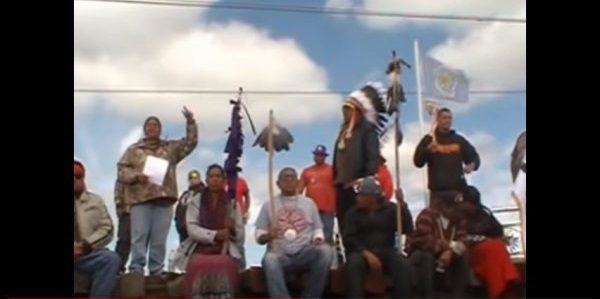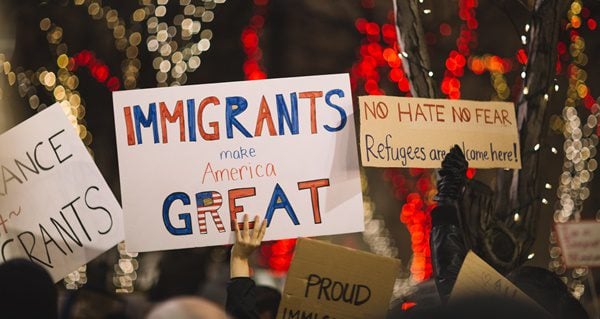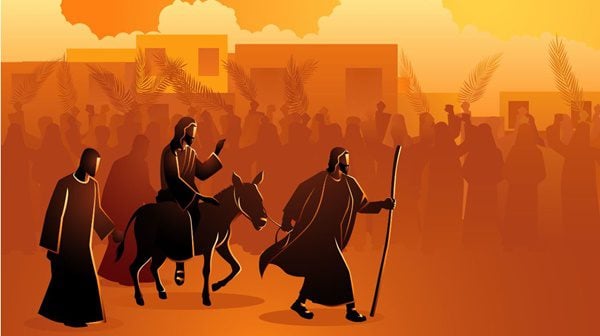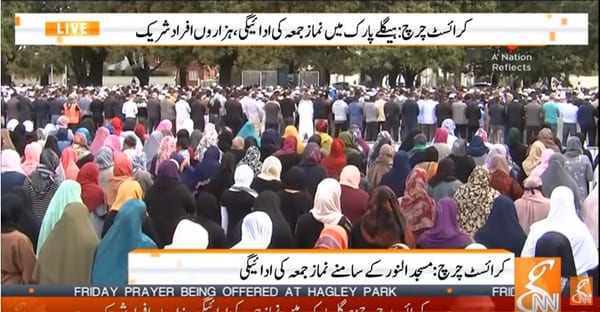 A federal court ruled against Standing Rock on the eve of Indigenous Peoples’ Day / Columbus Day. The legacy of Christopher Columbus: “Destroying land, water and people since 1492.” It’s so bitterly ironic. I’m enraged and on the verge of despair.
A federal court ruled against Standing Rock on the eve of Indigenous Peoples’ Day / Columbus Day. The legacy of Christopher Columbus: “Destroying land, water and people since 1492.” It’s so bitterly ironic. I’m enraged and on the verge of despair.
Studying Columbus’s atrocities, I come across a chapter from Howard Zinn about the genocide by Columbus in what would become Haiti. Then, noting the morbid cosmic synchronicity, I scroll downDemocracy Now’s “Headlines” page from the DAPL ruling to the death toll in Haiti from Hurricane Matthew, a country ravished by American greed long after Columbus, and I just feel caught up in a cycle of violence and chaos that never ends.
But I want to be hopeful. I don’t want to despair. On Sunday I listened to my ever-faithful priest preaching on abundance. In a world dominated by a narrative of scarcity, we are called to believe in an abundance of love, an abundance of blessing. Cynically, I think to myself that there is an abundance of cruelty and evil… but, could there also be an abundance of hope, an abundance of human potential for kindness and compassion and generosity and mercy? Could there be an abundance of repentance, of recognizing and turning from our destructive ways?
I think of what the finding of a new world might have been: a chance for those made in the image of God to meet others made in the image of God and know God more fully through each other. I think of how things might have been different if our ancestors had understood that God’s love is abundant and not limited to an elect… and if we knew that today. I wonder how things might have been different had Columbus known the blasphemous irony of his words when he wrote, “Let us in the name of the Holy Trinity go on sending all the slaves that can be sold.” How might things have been different if our ancestors had understood that they were crucifying Christ millions of times over?
I try to press on with hope, knowing that hundreds of years later most of us still known not what we do. I listen to candidates debate the danger of letting refugees onto “our” land after we have destroyed theirs, even as we continue to destroy the land we stole long ago for oil and profit. The refugees will come, no matter what our laws say, because we are destroying the rest of the world and people will wander what’s left of the earth as its habitable regions shrink. We might become refugees ourselves. And I think, how might we truly repent of the crimes our ancestors began long ago, crimes our laws and tax dollars continue? How might we turn ourselves from a culture of materialism and greed and exploitation and disregard for lives not close enough to our own, and learn to love each other, welcome each other, help each other? For as our land erodes and our water supply diminishes and our air becomes ever more toxic, we are also eroding another precious resource – trust – so essential to coming together and saving this sinking ship that is still our home.
Multiple crises are converging as war and global warming perpetuate one-another. A crisis is not just a time of disaster; it’s a time of testing. Humanity is being tested; our selfishness and paralyzing, isolating fears are being pitted against our empathy, our humility, our perseverance and compassion. It seems sometimes as if only a miracle could compel us to rise to our better natures en masse before we destroy ourselves as we have so frighteningly proven that we are capable of. But if we can summon the wisdom, humility, courage and kindness to recognize the Love at the core of our being that binds us to one another across all human divisions, we would see that hope is deeper and nearer to us than a miracle. Hope is rooted in our destiny to live into who we are meant to be. We are meant to find God in one-another, recognize our shared humanity in one-another, and realize that our destinies are intertwined.
We can nurture this hope until it blossoms into a new world, a world structured not on greed, blame, and fear, but on cooperation and kindness. We can live into a narrative of abundance instead of scarcity, a narrative that surrounds us but is blurred by our myopic fears. But it starts with turning ourselves around; it starts with repentance.
Yesterday, Indigenous Peoples’ Day coincided with the eve of Yom Kippur, the Jewish Day of atonement. With Indigenous Peoples’ Day still fresh in our minds, and with Yom Kippur commencing at sundown, now is the time to begin our new narrative as we remember all we have to repent. Observant Jews, in the days leading up to Yom Kippur, try to repent and ask forgiveness of their sins against fellow human beings, believing that God may forgive sins against God, but not sins against other humans. So, those of us who have benefitted from the privilege of Columbus’s conquest more than 500 years ago should repent, ask forgiveness, of the Native Americans whose ancestors were massacred, who were pushed onto small reservations of land, and who today suffer disproportionate poverty and the highest rate of police shootings in our nation. Today is a day to stand up and say “No!” to the Dakota Access Pipeline and “Yes!” to respect for the land and the people. It is a day for some of us to remember that either we or our ancestors were once immigrants, welcome those who seek refuge among us, and learn live so as to preserve this land. It is a day to remove our trampling shoes and tread more humbly, more gently, more softly. It’s a day to prepare ourselves to be atoned – made one – with God, by repenting and reconciling with one another.
Stay in the loop! Like Teaching Nonviolent Atonement on Facebook!











